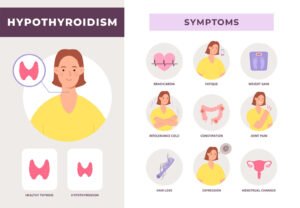The Keto Diet for Hashimoto’s: Natural Support for Thyroid Health
The keto diet for Hashimoto’s offers promising benefits for those struggling with this common thyroid disorder. Hashimoto’s thyroiditis, an autoimmune condition, often leads to hypothyroidism, causing various health issues.
By adopting the keto diet, individuals may find a natural way to support their thyroid function and overall health, as recent scientific findings support the potential benefits of this dietary approach.
What is Hashimoto’s Thyroiditis?
Hashimoto’s thyroiditis is an autoimmune disorder where the immune system mistakenly attacks the thyroid gland. This gland, located in the neck, is crucial for regulating metabolism, energy levels, and overall hormonal balance.
When the immune system targets the thyroid, it leads to chronic inflammation and damage. Over time, this usually result in hypothyroidism, a condition where the thyroid cannot produce enough hormones to meet the body’s needs.
Symptoms of hypothyroidism include fatigue, weight gain, cold intolerance, hair loss, and depression. If left untreated, it can lead to more severe health problems.
Prevalence of Hypothyroidism
Hypothyroidism is a widespread condition, particularly among women. In the United States, about 7.6% of women are affected by thyroid disease, which includes hypothyroidism. This prevalence is significantly higher compared to men.
Similarly, in Canada, thyroid dysfunction affects around 10% of the population aged 45 years or older, with a higher prevalence in women at 16%.
This gender disparity highlights the importance of addressing thyroid health, especially in the female population. Hashimoto’s thyroiditis is a leading cause of hypothyroidism in these cases, underscoring the need for effective management strategies.

Basics of the Keto Diet
The keto diet, short for ketogenic diet, is a low-carbohydrate, high-fat diet that has gained popularity for its health benefits. The primary goal of the keto diet is to shift the body’s metabolism from relying on glucose (sugar) as its main energy source to using ketones, which are produced from the breakdown of fats in the liver. This metabolic state is known as ketosis.
On a keto diet, the typical macronutrient ratio is approximately:
- 70-75% fats
- 20-25% proteins
- 5-10% carbohydrates
Common foods on a keto diet include:
- High-fat foods: avocados, nuts, seeds like flax seeds, olive oil, butter, and fatty fish
- Low-carb vegetables: leafy greens, broccoli, cauliflower, and zucchini
- Protein sources: meat, poultry, seafood eggs, and cheese
Helpful Reading: How Many Carbs a Day on Keto? – Your Ultimate Guide

How the Keto Diet Works
The keto diet works by significantly reducing carbohydrate intake, which lowers insulin levels and forces the body to enter a state of ketosis. In ketosis, the body becomes highly efficient at burning fat for energy. This process also generates ketones, which serve as an alternative energy source for the brain and other organs.
The keto diet offers several general health benefits, including:
- Weight loss: By using stored fat for energy, many people experience significant weight loss.
- Improved mental clarity and focus: Ketones are a more efficient fuel for the brain than glucose.
- Increased energy levels: Stable blood sugar levels prevent the energy crashes associated with high-carb diets.
- Reduced inflammation: Lower insulin levels and less oxidative stress can lead to decreased inflammation in the body.
Benefits of the Keto Diet for Hashimoto’s Disease
Reducing Inflammation
A 2024 study published in Endocrine Connections, provides valuable insights into the benefits of a low-carbohydrate diet for Hashimoto’s disease.
This study focused on the impact of such a diet on thyroid inflammation in patients with Hashimoto’s thyroiditis. Using advanced MRI techniques, the researchers measured changes in thyroid water content, which is a marker of inflammation.
In this study, forty patients with Hashimoto’s thyroiditis were divided into two groups. One group followed a normal diet, while the other adopted a low-carbohydrate diet for six months.
The results were significant. Patients on the low-carbohydrate diet showed a reduction in thyroid water content from 94.84% to 93.07%. Additionally, there was a decrease in levels of thyroid peroxidase antibodies (TPOAb) and thyroglobulin antibodies (TgAb), which are markers of thyroid inflammation and autoimmune activity.
The study concluded, “Following a low-carbohydrate diet intervention, there is a significant reduction in thyroid water content and a decrease in levels of TPOAb and TgAb,” indicating reduced thyroid inflammation.

Interestingly, the control group, which maintained a normal diet, did not exhibit significant changes in thyroid water content or antibody levels. This contrast underscores the potential anti-inflammatory benefits of a low-carbohydrate diet for patients with Hashimoto’s thyroiditis.
The researchers also highlighted the accuracy and effectiveness of MRI in quantifying inflammation, noting, “Dixon-T2WI can quantitatively assess the degree of thyroid inflammation in patients with Hashimoto’s thyroiditis.”
Study participants on the low-carbohydrate diet showed a decrease in levels of thyroid peroxidase antibodies (TPOAb) and thyroglobulin antibodies (TgAb), which are markers of thyroid inflammation and autoimmune activity.
Improving Thyroid Function
The implications of these findings are significant for those managing Hashimoto’s thyroiditis. By reducing carbohydrate intake, patients often experience a decrease in thyroid inflammation and autoimmune activity. This reduction in inflammation can potentially lead to improved thyroid function, as the thyroid gland becomes less damaged and more capable of producing essential hormones.
The decrease in antibodies like TPOAb and TgAb suggests that the immune system’s attack on the thyroid gland is less intense, allowing for better thyroid health.
These results align with the broader understanding of how diet can influence autoimmune conditions. By adopting the keto diet, individuals with Hashimoto’s thyroiditis may find not only a reduction in symptoms but also an overall improvement in their thyroid function and general health.
As the researchers concluded, “These results suggest that a low-carbohydrate diet may help alleviate inflammation in patients with Hashimoto’s thyroiditis,” offering a promising approach to dietary therapy for this chronic condition.
The researchers concluded, “These results suggest that a low-carbohydrate diet may help alleviate inflammation in patients with Hashimoto’s thyroiditis.”
Practical Tips for Following the Keto Diet
Getting Started with the Keto Diet
Starting the keto diet can be a smooth transition with some preparation and understanding. Here are some steps to help you get started:
- Educate Yourself: Learn about the keto diet principles and how it works. Understanding the science behind it can motivate and guide you.
- Plan Your Meals: Create a meal plan that includes high-fat, moderate-protein, and low-carb foods. Include a variety of foods to ensure you get all the necessary nutrients.
- Stock Your Kitchen: Clear out high-carb foods and stock up on keto-friendly items like avocados, nuts, flax seeds, olive oil, butter, fatty fish, leafy greens, and meats.
- Monitor Your Macros: Use a food diary or an app to track your macronutrient intake and ensure you stay within the recommended ratios for ketosis.
- Stay Hydrated: Drink plenty of water to stay hydrated and help your body adjust to the new diet.
Helpful Reading: Natural Appetite Control: How Keto Curbs Your Hunger

Maintaining the Diet
Maintaining the keto diet can be challenging, but with the right strategies, you can stay on track and enjoy its benefits:
- Stay Consistent: Consistency is key to achieving and maintaining ketosis. Stick to your meal plan and avoid high-carb foods.
- Find Keto-Friendly Alternatives: Look for low-carb substitutes for your favorite foods, like cauliflower rice, zucchini noodles, and keto-friendly desserts.
- Stay Informed: Keep learning about new keto recipes and tips to keep your diet interesting and enjoyable.
- Listen to Your Body: Pay attention to how your body responds to the diet and make adjustments as needed.
- Join a Community: Connecting with others who follow the keto diet can provide support, motivation, and helpful tips.
Helpful Reading: Road Trip Food Planner for Keto Dieters
By following these practical tips, you can successfully adopt and maintain the keto diet, potentially improving your thyroid health and overall well-being.

Final Thoughts
The keto diet for Hashimoto’s offers a natural and effective way to manage thyroid health. With its proven benefits in reducing inflammation and autoimmune activity, the keto diet provides hope for those struggling with Hashimoto’s thyroiditis. By adopting this low-carb, high-fat dietary approach, individuals may experience improved thyroid function and overall well-being.
The positive findings from recent studies, such as the one published in Endocrine Connections, highlight the potential of the keto diet as a valuable tool in managing Hashimoto’s thyroiditis. This dietary change, combined with proper medical care, can offer significant improvements in quality of life.
If you are considering the keto diet, start by educating yourself and making gradual changes to your eating habits. Seek the support of a community and consult healthcare professionals to ensure the diet suits your specific needs. By taking these steps, you can harness the benefits of the keto diet and support your thyroid health naturally.
Take charge of your thyroid health today by exploring the keto diet. The journey may lead to better health, more energy, and a brighter future.
References
- MRI quantitative assessment of the effects of low-carbohydrate therapy on Hashimoto’s thyroiditis. Endocrine Connections
- High Glucose Intake Exacerbates Autoimmunity… Immunity
- Very‐low‐carbohydrate diet enhances human T‐cell immunity… EMBO Molecular Medicine
- Low-Carbohydrate, High-Fat Diet Improves Inflammatory Markers… Journal of Strength & Conditioning Research
Keto PowerFlax Baking Mix: Keto & So Much More!

- Commercial Bakeries: you can easily produce delicious flax-based keto-friendly products which are clean label, high protein, high fiber and vegan
- Works with your current equipment and baking processes
- Recipes provided on all bulk orders, with ongoing customer support
- Worldwide shipping
- Get in touch with us today!
What to Read Next:

- Keto Diet for Thyroid Cancer: New Hope from Scientific Studies
- Keto Diet for MS: Science Shows It Can Improve MS
- Healing Disease Through Diet: Why Ketosis Works
- Keto Diet For Migraines: New Study
- The Chronic Fatigue Syndrome Diet (Keto For CFS)
- Keto Diet for Psoriasis: Scientific Studies on Natural Relief
- How Many Carbs a Day on Keto? – Your Ultimate Guide

